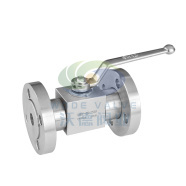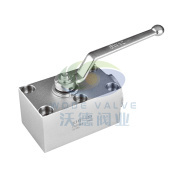News
Exploring the Versatile Applications of Hydraulic Ball Valves in Industrial Settings
Time:
Feb 14,2025
Common Applications of Hydraulic Ball Valves in Industrial Settings
Introduction to Hydraulic Ball Valves
Hydraulic ball valves are essential components in various industrial applications, known for their ability to regulate flow and pressure with precision and reliability. Their design features a spherical disc, or "ball," which acts as the primary closure mechanism, allowing for quick and effective control of fluid flow. These valves are particularly useful in high-pressure systems where durability and reliability are paramount.
Understanding the Mechanism of Hydraulic Ball Valves
To appreciate the applications of hydraulic ball valves, it's crucial to understand how they operate. When the valve handle is turned, the ball rotates to open or close the flow path. Due to their straightforward design, these valves offer minimal flow resistance, making them suitable for various hydraulic applications. The ball’s smooth surface reduces friction, ensuring rapid operation and efficient flow management.
Advantages of Using Hydraulic Ball Valves
Hydraulic ball valves come with several advantages, making them a preferred choice in industrial settings:
1. Excellent Flow Control
These valves provide precise control over flow rates and pressure, essential in maintaining optimal operational conditions in hydraulic systems.
2. Quick Operation
The quarter-turn operation enables rapid opening and closing, which is vital in emergency situations or when quick adjustments are needed.
3. Low Maintenance
With fewer moving parts than other valve types, hydraulic ball valves require less frequent maintenance, leading to reduced operational costs.
4. Versatility
Their ability to handle various fluids, including gases and corrosive substances, makes them suitable for multiple industries.
5. Durability
Constructed from robust materials, hydraulic ball valves can withstand extreme pressures and temperatures, ensuring long service life even in harsh environments.
Key Industrial Applications of Hydraulic Ball Valves
Hydraulic ball valves find applications in numerous industries, each with unique requirements. Below are some of the most common industrial settings where these valves excel.
1. Oil and Gas Industry
In the oil and gas sector, hydraulic ball valves are integral to controlling the flow of oil, natural gas, and other fluids. Their ability to handle high pressures and corrosive materials makes them ideal for pipeline management, wellhead control, and downstream processing. The reliability of these valves ensures safety and efficiency in operations, reducing the risk of leaks and spills.
2. Water Treatment Facilities
Water treatment facilities utilize hydraulic ball valves for regulating water flow and pressure during filtration and distribution processes. These valves are essential in managing the various stages of water purification, including chemical dosing, sedimentation, and disinfection, ensuring that potable water standards are met.
3. Chemical Processing Industries
In chemical plants, hydraulic ball valves are vital for controlling the flow of hazardous substances. Their ability to provide tight sealing and prevent leaks is crucial in maintaining safety and compliance with environmental regulations. These valves handle aggressive chemicals, ensuring safe transportation and storage.
4. Food and Beverage Industry
The food and beverage industry employs hydraulic ball valves to manage fluid flows in processing lines. These valves ensure hygienic operations, as they can be easily cleaned and sanitized. They are used in brewing, bottling, and dairy processing, where maintaining product integrity is essential.
5. Pharmaceutical Manufacturing
In pharmaceutical applications, maintaining product quality and compliance with regulations is critical. Hydraulic ball valves facilitate precise control of fluid dynamics in the production of medicines and vaccines. Their sanitary design ensures that contamination is minimized throughout the manufacturing process.
6. HVAC Systems
Hydraulic ball valves play a significant role in Heating, Ventilation, and Air Conditioning (HVAC) systems. They help control water flow in heating and cooling equipment, ensuring efficient temperature regulation in commercial and residential buildings. Their quick operation allows for effective system balancing.
7. Mining and Metallurgical Industries
In mining operations, hydraulic ball valves are utilized for controlling the flow of slurry and other materials. Their robust construction withstands the harsh conditions often found in mining sites. These valves assist in material transport and processing, facilitating efficient operations.
Choosing the Right Hydraulic Ball Valve for Your Application
Selecting the appropriate hydraulic ball valve involves considering various factors to ensure optimal performance and safety. Here are some aspects to evaluate:
1. Material Compatibility
The construction material of the valve must be compatible with the fluid being handled. Common materials include stainless steel, brass, and PVC, each suited for different applications.
2. Pressure and Temperature Ratings
Understanding the pressure and temperature requirements of your system is essential. Ensure that the chosen valve can withstand the maximum expected conditions to avoid failures.
3. Valve Size
The size of the valve should match the pipe diameter to ensure proper flow rates. Oversized or undersized valves can lead to inefficiencies and increased operational costs.
4. Actuation Method
Hydraulic ball valves can be operated manually or automatically. Consider the operational requirements of your system when selecting the actuation method.
5. Valve Type
Choose between full port and reduced port valves based on your flow requirements. Full port valves offer less resistance and higher flow rates, while reduced port valves are more compact.
Maintenance Practices for Hydraulic Ball Valves
To ensure longevity and optimal performance of hydraulic ball valves, regular maintenance is essential. Here are some best practices:
1. Regular Inspections
Conduct visual inspections to check for signs of wear, corrosion, and leaks. Identify any issues early to prevent costly repairs.
2. Clean and Lubricate
Keep the valves clean from debris and contaminants that could affect their performance. Lubricate the moving parts as necessary to facilitate smooth operation.
3. Check Seals and Gaskets
Inspect seals and gaskets for damage or deterioration. Replace any worn components to maintain a tight seal and prevent leaks.
4. Test Operation
Periodically test the valve operation to ensure that it opens and closes smoothly. If any resistance is noted, investigate the cause promptly.
5. Follow Manufacturer Guidelines
Adhere to the manufacturer's maintenance recommendations for specific valve models to ensure proper care and functionality.
Future Trends in Hydraulic Ball Valve Technology
As industries evolve, so does valve technology. Emerging trends in hydraulic ball valves include:
1. Smart Valve Technology
The integration of IoT technology allows for real-time monitoring and control, enhancing system efficiency and predictive maintenance.
2. Improved Materials
Advancements in materials science are leading to the development of more durable and corrosion-resistant valve materials, expanding their application range.
3. Automation and Remote Operation
Increasing demand for automation in industrial settings is driving the need for remotely operable ball valves, allowing for better control and monitoring.
Frequently Asked Questions (FAQs)
1. What is the primary function of hydraulic ball valves?
Hydraulic ball valves control the flow of fluids within a system, allowing for precise regulation of liquid or gas movement.
2. How do I choose the right size hydraulic ball valve?
Select a valve size that matches the diameter of your piping system to ensure optimal flow rates without excessive pressure drop.
3. Can hydraulic ball valves handle corrosive fluids?
Yes, hydraulic ball valves can be made from materials that resist corrosion, making them suitable for handling aggressive chemicals.
4. What maintenance is required for hydraulic ball valves?
Regular inspections, cleaning, lubrication, and seal checks are essential to maintain the functionality and longevity of hydraulic ball valves.
5. Are hydraulic ball valves suitable for high-pressure applications?
Yes, hydraulic ball valves are designed to handle high-pressure environments, making them ideal for many industrial applications.
Conclusion
Hydraulic ball valves are pivotal components in various industrial settings, offering excellent control, durability, and low maintenance. Their versatility allows them to be effectively utilized across multiple industries, including oil and gas, water treatment, food and beverage, and pharmaceuticals. By understanding their applications, advantages, and maintenance needs, industrial operators can ensure efficient and safe operations. As technology advances, the future of hydraulic ball valves looks promising, with innovations leading to enhanced efficiency and functionality. Investing in the right hydraulic ball valve is crucial for optimal system performance and reliability.
RELATED NEWS




